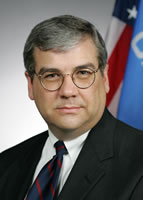In order to provide equal access and equal opportunity to people with diverse abilities, this site has been designed with accessibility in mind. Click here to view
Crain and Cox say just-released Leavitt Report on improving access to insurance/health care mirrors SB 640 recommendations
 Sen. Brian Crain
Sen. Brian Crain
Two lawmakers who took on the task of creating an Oklahoma-based solution for increasing access to health care said a new report commissioned by the Oklahoma Health Care Authority (OHCA) mirrors many of the recommendations they had included in Senate Bill 640. The Utah-based Leavitt Partners presented their findings on Thursday to OHCA’s governing board. Sen. Brian Crain, R-Tulsa, and Rep. Doug Cox, M.D., R-Grove, said the report shows they were on the right track with their proposals.
Oklahoma leaders have steadfastly refused to expand Medicaid arguing the plan would ultimately prove too costly for the state. However, the state’s program to enable greater access to health care insurance, Insure Oklahoma, could see its federal support eliminated by the end of this year unless OHCA receives a waiver for continued funding. The Leavitt Report recommended modifying Insure Oklahoma as a way to increase access to health care.
“That was a key provision in SB 640. We finalized our proposals in a Conference Committee, but the bill was not acted on by the end of the 2013 session,” said Crain, Chairman of the Senate Health and Human Services Committee. “Other recommendations in the Leavitt Report mirror additional provisions in SB 640.”
Other conclusions reached by the Leavitt Report that parallel SB 640 include:
- Emphasis on Health Homes
- Cost sharing (co-pay)
- Incentivized health outcomes
- 138% of Federal Poverty would be covered
- Utilizes the Insure Oklahoma structure
- Recommends negotiations with the federal government to keep the current structure in place
- Incentives for positive health behaviors, such as using generic prescription drugs and seeking appropriate care, etc.
“Insure Oklahoma is a program that’s helped thousands of Oklahomans purchase insurance through a public private partnership. This proven approach, rather than a government controlled exchange, is the way to help more of our citizens increase access to health care through the private market,” said Cox, Chairman of the House Appropriations and Budget Committee on Health and Social Services. “The Leavitt Study supports that approach.”
 Oklahoma Senate
Oklahoma Senate

